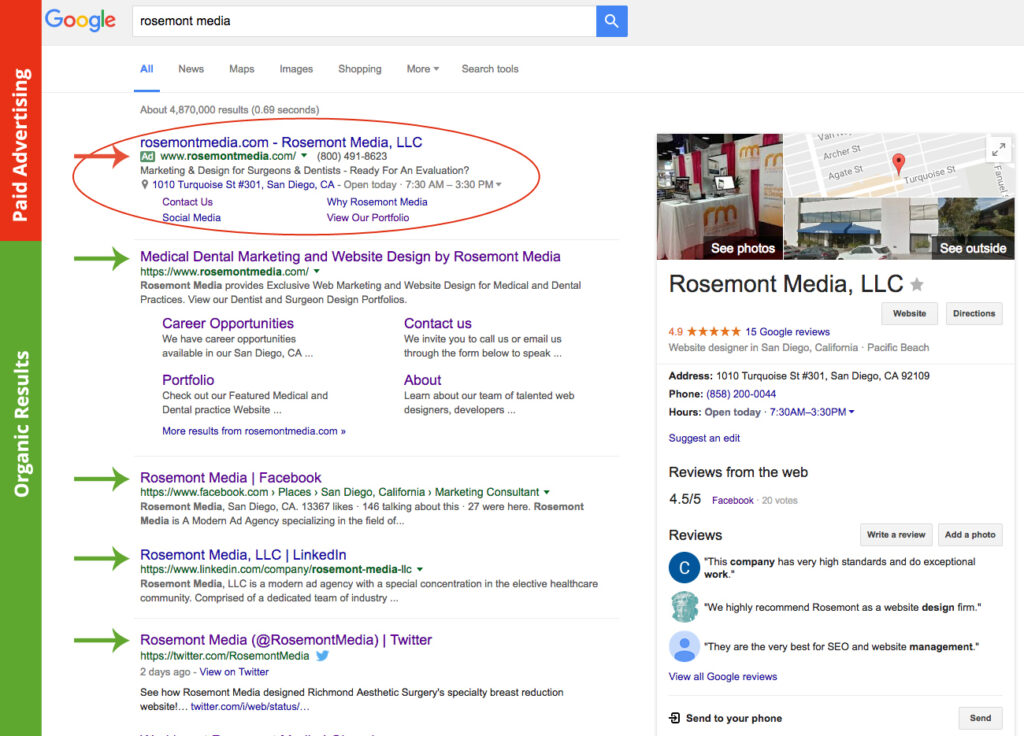Industry Jargon Explained: What Are Organic Search Results?

When you submit a phrase or question to a search engine, you receive two kinds of results: organic and paid. Whereas paid results are essentially targeted advertisements, organic search results are unpaid listings the search engine has deemed to be the most relevant resources related to your search. Since the vast majority of people use Google as their preferred search engine, let’s use Google’s search results as an example.
When I search for Rosemont Media, this is a snapshot of the results I see on Google. The first listing is a pay-per-click ad we have purchased, which is denoted with a small green box reading “Ad,” and below that are the unpaid, organic listings that Google has provided to help me learn more about my search topic, “Rosemont Media.” Depending on the nature of the search you submit, the results layout may change, but paid listings are always going to say “Ad.”

Why Is My Organic Positioning Important?
Prime organic positioning is essentially free to those who invest the time, energy, and resources it takes to create a website that Google will favor with its infamous, ever-changing algorithm. Also, organic results are most often interpreted to be the most reliable sources of information by Google users. Here are some key benefits of organically ranking well:
Increased Organic Traffic to Your Website
Users are more likely to click on high-ranking organic results rather than paid results, as paid results may appear as biased and less reputable. Also, having a high-ranking page in Google’s results is like advertising you do not have to pay for and can be an indicator of future growth. This is why it is important for businesses to make organic positioning a priority in their marketing plan.
A Competitive Advantage
When your website ranks higher than others, it boosts your credibility. People are more likely to click the link that is closer to the top of the search engine results page over other competing webpages. By outranking the competition, more organic traffic should come to your website essentially helping your rankings in the long run. Google will likely continue to favor your webpage until a better result is found. With a relevant and informative website, though, your rankings should still remain at a high position.
Be Viewed as an Expert in the Industry
By being at the top of search results, it will be easier to dominate your market and be considered an expert in the industry. Once people trust and invest in your content, more people will come back to find information on other relevant subjects. When users see that you are at the top of an organic search, it automatically increases their trust in your business and the perceived value of your webpage.
For medical and dental websites, we highly recommend focusing a significant portion of your website marketing budget to improving organic positioning for search terms related to the location of your practice and the services you provide. Achieving these goals is by no means a small task; however, with the guidance of a dynamic website marketing company, you can cultivate a comprehensive search engine optimization strategy that will help maximize your website’s organic visibility and deliver measurable results.
Rosemont Media Can Help
Interested in learning more about how you can improve your health care website’s organic positioning on Google? Contact our knowledgable representatives at Rosemont Media for a full evaluation of your website performance. Our experienced marketing specialists can explain the value of our services and discuss a custom-tailored strategy designed to help your practice succeed online.
Editor’s note: The original version of this post was published on December 6, 2016.